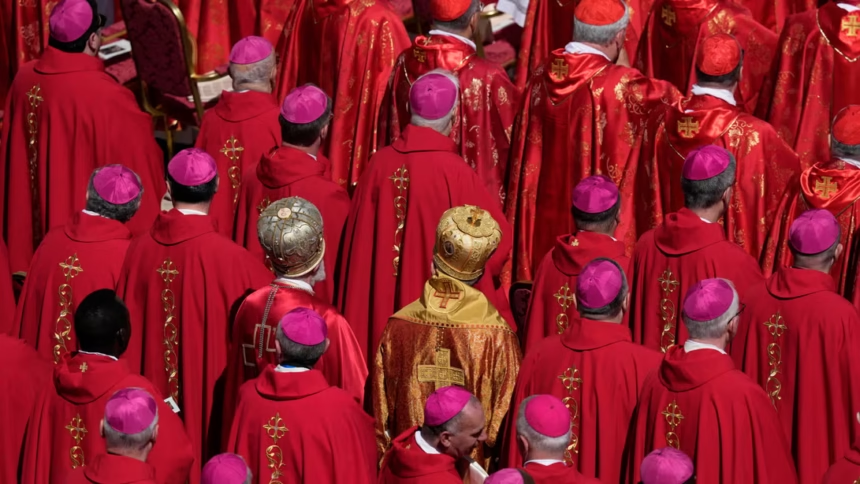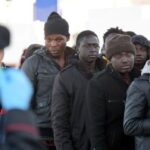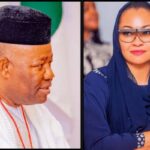Following the conclusion of the funeral of Pope Francis, the attention of the global community has now turned to the Vatican as the papal conclave is set to begin.
This marks the start of the selection process for the 267th pope to succeed Pope Francis who passed away on April 21, 2025.
Recall that the late pontiff passed away at 88 after a prolonged respiratory illness, leaving behind a legacy that will shape the Catholic Church’s future.
Following his demise, 135 cardinals from across the globe are now set to gather in the Sistine Chapel to elect the 267th pope, a decision that will influence the direction of the 1.4 billion-strong Catholic Church.
The cardinals are set to hold their fifth general meeting since the pope’s death, on Monday, where they are expected to pick a date for the papal conclave.
While the exact date the Cardinals will choose is unknown yet, it is expected that the papal conclave begins 15 to 20 days after a pope’s passing, with the process expected to start between May 6 and May 11, 2025.
Luxembourg Cardinal Jean-Claude Hollerich also confirmed this, saying that he expects the conclave to take place on May 5 or 6, shortly after the nine days of papal mourning, which ends on May 4.
German Cardinal Reinhard Marx, who spoke with the press on the sideline of Pope Francis’s burial, said he believes the papal conclave would last just “a few days”.
During the papal conclave, cardinals under 80 years old, appointed by previous popes, will cast their votes in a series of ballots until a candidate secures a two-thirds majority.
The process is normally held behind the locked doors of the Sistine Chapel and is designed to ensure a consensus-driven selection.
The papal conclave begins with the cardinals taking a vow of secrecy, ensuring no external communication during the voting process.
They reside in the Domus Santa Marta, a Vatican guesthouse, and are sequestered from the outside world, cut off from phones, television, and the internet.
Voting occurs twice daily, with ballots burned after each session. Black smoke signals no decision, while white smoke announces the election of a new pope.
The conclave’s duration varies, but recent history suggests a swift process. Since the 20th century, the average conclave has lasted three days, with the longest in 1922 taking five.
Pope Francis, the first Latin American pope, was elected in 2013 after just two days of voting, one of the shortest conclaves in modern history.
Once a candidate secures the required two-thirds vote, the dean of the College of Cardinals, Cardinal Giovanni Battista Re, will ask the electee, “Do you accept your canonical election as Supreme Pontiff?”
Upon acceptance, the new pope chooses his papal name, and the world is introduced to the new leader of the Catholic Church.
Also, one of Pope Francis’ enduring legacies is the diversification of the College of Cardinals. Approximately 80% of the 135 voting cardinals were appointed by Francis, hailing from regions as diverse as Asia, Africa, and Latin America.
This shift has altered the traditional European dominance, with Asian cardinals now representing nearly a quarter of the electors and African cardinals forming a significant voting bloc.
The increased representation of the Global South could influence the selection process, potentially leading to a record-breaking emergence of a new pope in centuries.
Speculation about potential candidates remains sketchy because the selection process is unpredictable.
However, among the names circulating as the potential pope are Cardinal Luis Antonio Tagle of the Philippines, dubbed “the Asian Francis” for his progressive views and charisma, and Cardinal Pietro Parolin, an Italian diplomat favoured for his experience as Vatican Secretary of State.
Other contenders include Cardinal Timothy Radcliffe, a British Dominican known for his spiritual writings, and Cardinal Reinhard Marx of Germany, who has emphasized an open debate in the conclave.
Also, two African cardinals have emerged as notable contenders: Cardinal Peter Kodwo Appiah Turkson of Ghana and Cardinal Fridolin Ambongo Besungu of the Democratic Republic of the Congo.





